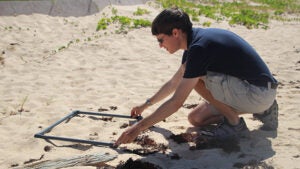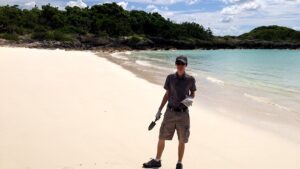BIOS Bermuda Program Intern Comes Full Circle

Shane Antonition, a part-time research assistant at the Bermuda Aquarium, Museum, and Zoo (BAMZ) and a graduate of the master’s program in environmental consultancy at the University of Plymouth (England), spent five summers working as an intern in the BIOS Bermuda Program. This summer, he returned to serve as a mentor in the program, co-mentoring three students along with BIOS director of education and community engagement Kaitlin Noyes, on projects that focused on marine microplastics. Over a period of three months, much of his time was spent conducting fieldwork to quantify the amounts and types of microplastics present on Bermuda’s beaches.
The BIOS Bermuda Program was conceived in 1976 as an effort to increase interest among young Bermudians in careers in the marine sciences. The design of the program today remains largely the same, providing a handful of promising students, ages 18 and older, with stipends to work alongside BIOS scientists each summer on research projects in marine and atmospheric sciences.
Since its inception, more than 150 Bermudian students have taken part in this hands-on internship program, but only a handful have returned to serve as mentors. This year, Bermuda Program alum Shane Antonition co-mentored three students, along with BIOS director of education and community engagement Kaitlin Noyes, in what was the Institute’s largest single summer internship cohort—21 students.
From 2014 to 2018, Antonition, now 26, spent five summers as a Bermuda Program intern, working on a variety of research projects spanning current topics in marine and atmospheric sciences. In 2014 he enrolled in the University of Plymouth (England), where he graduated three years later with a bachelor of science (honors) in environmental science, which balanced terrestrial and marine topics and put an emphasis on practical fieldwork. He then continued his studies at Plymouth and graduated in 2018 with a master of science in environmental consultancy.
Today, Antonition works as a part-time research assistant to Robbie Smith, curator of the Natural History Museum at the Bermuda Aquarium Museum and Zoo (BAMZ) and BIOS adjunct faculty.
We had the opportunity to speak with Antonition after the 2020 summer internships ended to learn more about his involvement with the Bermuda Program and hear what it was like to experience the program from a different perspective.

In 2016, Antonition was a Bermuda Program intern under mentor Robbie Smith, curator of the Natural History Museum at BAMZ and BIOS adjunct faculty. During that time, he conducted research on marine microplastics that also served as the foundation for his undergraduate dissertation. With this, he graduated in 2017 with a bachelor of science degree in environmental science from the University of Plymouth.
What made you want to apply to the Bermuda Program? What were you hoping to gain from the experience?
When I first applied to the Bermuda Program, I was at a crossroads in my academic career between environmental engineering and environmental science and research. Growing up in Bermuda, I was instilled with a love for our island environment and a deep appreciation for how fragile it is. During my high school years at Mount Saint Agnes Academy, I knew that I wanted my career path to be dedicated toward protecting our unique ecosystems. After looking at environmental engineering as one path, I wanted to confirm that environmental science and research was the right path for me. Through the Bermuda Program I hoped to gain the experience of working in a research environment, as well as transferable skills that would be valuable academically and professionally.
Can you share details of the research program(s) that you worked on during the Bermuda Program? What was the experience like for you?
Having spent five summers as a Bermuda Program intern, it’s hard to forget these amazing experiences because I covered a range of topics. I created a mercury inventory for Bermuda using a United Nations Environmental Programme toolkit; conducted a study on the effectiveness of traditional shark oil barometers; sampled microplastics on beaches and in baitfishes; and finally, investigated novel invasive marine invertebrates in Bermuda’s marinas. It was humbling to be mentored by experienced and passionate scientists, including environmental chemist Andrew Peters, atmospheric scientist Mark Guishard, and marine biologist Robbie Smith, whom I worked for during my last three summers in the Bermuda Program.
The passion that each of these researchers had for their work inspired me as a young scientist because they not only supported my independent projects, but also took the time to teach me about their respective fields. As the years went on, I found the Bermuda Program and my university studies developed a unique symbiotic relationship. The Bermuda Program made me a better and more confident scientist for my academic career which, in turn, improved my work quality and ethic every summer that I returned to the program.
Can you describe your current position and what it entails?
As a research assistant at BAMZ I’ve been able to continue working with Dr. Smith on some of the work I started during my master’s degree, which looks at invasive exotic species in Bermuda’s marinas. I’ve also been able to support elements of Smith’s study on Sargassum (marine macroalgae) communities, looking at the species of Sargassum and their associated fauna. Through his contacts, I’ve also been afforded some amazing opportunities, including the first Ocean Plastics Leadership Summit and the Greenpeace Expedition to the Sargasso Sea, which I was involved with as the local scientist specializing in microplastics, providing expertise on the sampling and processing of marine debris.
What was it like mentoring Bermuda Program students? Do you think you were able to be a better mentor having been a Bermuda Program intern yourself?
Being a mentor for the Bermuda Program was incredibly rewarding and it really felt like I was coming full circle. It was a bit of an adjustment, admittedly, but coming from the perspective of a previous intern certainly helped me. I knew there was a fine balance between providing insight and guidance, but also project independence, to allow for personal growth.
I certainly think the best part of being a mentor this year was taking my previous experiences and combining them with the fieldwork and research I’ve done. I’ve grown as a scientist and gained a more extensive knowledge-base on the issue of marine microplastics. Being able to use that to guide a passionate team of students to create a framework and dataset that went well beyond what I was able to do on my own four years ago is what I was really proud of. I would do it again in a heartbeat!

To quantify the amounts and types of microplastics present on Bermuda’s beaches, Antonition must sort through samples with forceps to separate small fragments of plastic from Sargassum seaweed and sand. Research into marine microplastics can help scientists identify their sources, which can then assist decision makers in developing plans to control the impacts of microplastics on coastal and marine environments.
Do you have any advice for current students interested in following a similar career path?
One major thing I’ve learned from my career path so far is the importance of being honest with yourself. Environmental studies and scientific research can be quite challenging at times and the jargon can initially be off-putting. There are times where I’ve had to put in long hours, or work in the field in inclement conditions. You just have to enjoy it, and my love for the environment and learning has kept me motivated through my academic and professional career. I also find it particularly rewarding to be able to share my research with a wider audience, since we truly need everyone’s efforts to conserve our planet’s ecosystems.
In order to understand if your chosen path is the right one for you, experiences like the Bermuda Program are fantastic options because they get you in the field, in the lab, and in the active research environment. Internships, volunteering, or work-shadow opportunities are key to gauging whether the discipline is right for you. On a related note, once you’ve settled on an area of study, carefully research your university choices. The curriculum of each institute can vary in structure and teaching philosophy. Try to understand your learning style and choose according to what is most appropriate.
